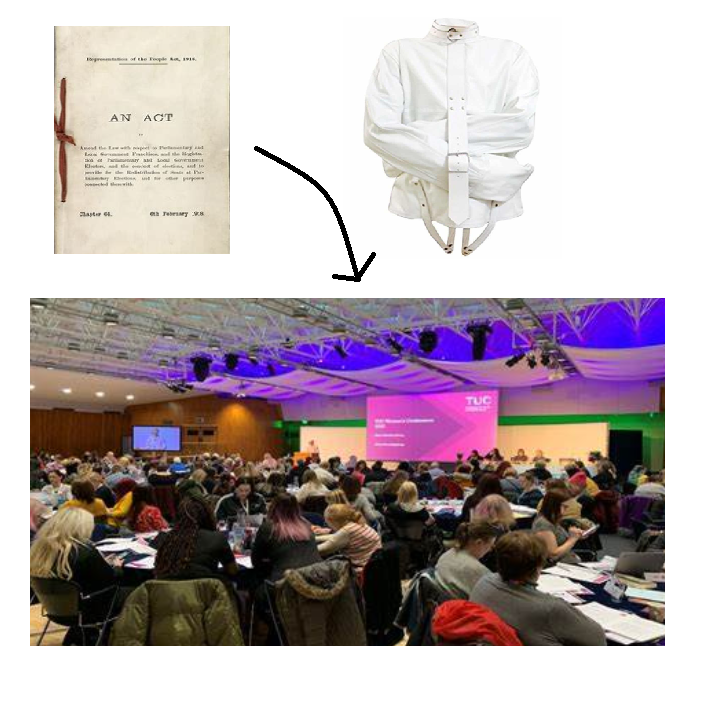Edwards v Halliwell [1950] 2 All ER 1064
Citation:Edwards v Halliwell [1950] 2 All ER 1064
Link to case on WorldLII (reference).
Rule of thumb:What happens if the exact processes in trade unions are not followed? Can the members by majority vote pass a resolution affirming that this was okay? No, the exact rules have to be followed or else one union member can have the process declared null & void with everything having to be started again.
Judgment:
The facts of this case were that this was a trade union for workers who built cars/vehicles/automotives. One of the directors of the union increased the fees that all the members had to pay so that additional services could be provided by the union in the future, but he did not follow the correct process before doing this – he obtained a majority of support from delegates/members at a meeting, but in addition there was also supposed to be a ballot requiring 2/3 support amongst members to decide this type of matter, and this was not done by the director in this case. A member was able to sue the director and have this action increasing fees overturned as invalid and have the fees returned to their normal size.
‘The rule in Foss v Harbottle, as I understand it, comes to no more than this. First, the proper plaintiff in an action in respect of a wrong alleged to be done to a company or association of persons is prima facie the company or the association of persons itself. Secondly, where the alleged wrong is a transaction which might be made binding on the company or association and all its members by a simple majority of the members, no individual member of the company is allowed to maintain an action in respect of that matter for the simple reason that, if a mere majority of the members of the company or association is in favour of what has been done, then cadit quaestio. No wrong has been done to the company or the association and there is nothing in respect of which anyone can sue. If, on the other hand, a simple majority of members of the company or association is against what has been done, then there is no reason why the company or association itself should not sue. In my judgment, it is implicit in the rule that the matter relied on as constituting the cause of action should be a cause of action properly belonging to the general body of corporators or members of the company or association as opposed to a cause of action which some indivudal member can assert in his own right... The cases falling within the general ambit of the rule are subject to certain exceptions. It has been noted in the course of argument that in cases where the act complained of is wholly ultra vires the company or association, the rule has no application because there is no question of the transaction being confirmed by any majority. It has been further pointed out that where what has been done amounts to what is generally called in these cases, a fraud on the minority and the wrongdoers are themselves in control of the company, the rule is relaxed in favour of the aggrieved minority who are allowed to bring what is known as a Minority Shareholder's action on behalf of themselves and all others. The reason for this is that, if they were denied that right, their grievance would never reach the court because the wrongdoers themselves being in control, would not allow the company to sue. Those exceptions are not directly in point in this case, but they show, especially the last one, that the rule is not an inflexible rule and it will be relaxed where necessary in the interests of justice... There is a further exception which seems to me to touch this case directly. That is the exception noted by Romer J. In Cotter v National Union of Seamen. He pointed out that the rule did not prevent an individual member from suing if the matter in respect of which he was suing was one which could validly be done or sanctioned, not by a simple majority of the members of the company or association, but only by some special majority, as, for instance, in the case of a limited company under the Companies Act, a special resolution duly passed as such. As Romer J. pointed out, the reason for that exception is clear, because otherwise, if the rule were applied in its full rigour, a company, which, by its directors, had broken its own regulations by doing something without a special resolution which could only be done validly by a special resolution could assert that it alone was the proper plaintiff in any consequent action and the effect would be to allow a company acting in breach of its articles to do de facto by ordinary resolution that which according to its own regulations could only be done by special resolution. That exception exactly fits the present case inasmuch as here the act complained of is something which could only have been validly done, not by a simple majority, but by a two thirds majority obtained by ballot vote. In my judgment, therefore, the reliance on the rule in Foss v Harbottle in the present case may be regarded as misconceived on that ground alone’, Jenkins LJ

Warning: This is not professional legal advice. This is not professional legal education advice. Please obtain professional guidance before embarking on any legal course of action. This is just an interpretation of a Judgment by persons of legal insight & varying levels of legal specialism, experience & expertise. Please read the Judgment yourself and form your own interpretation of it with professional assistance.

